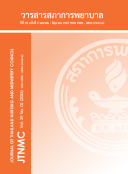The Development of a Family and Community-based Treatment and Rehabilitation Model for Substance Users
DOI:
https://doi.org/10.60099/jtnmc.v39i02.269039Keywords:
model, treatment and rehabilitation, substance users, family, communityAbstract
Introduction Substance abuse has severe impacts on daily life and property of patients, families, and communities. Treatment and rehabilitation of drug users through a family and community-based approach is a key to promote and support family and community participation in addressing substance abuse. This approach centers on the patients, their families, and their communities, which enhances the effectiveness and sustainability of substance abuse resolution.
Objectives 1) To describe nurses’ and health team’s perception regarding factors influencing the treatment and rehabilitation of substance users through a family and community-based approach, and 2) To develop a family and community-based treatment and rehabilitation model for substance users.
Design This study employed Research and Development, conducted in four phases. This article presents phases 1 and 2.
Methodology The development of a family and community-based treatment and rehabilitation model for substance users in phase 1 consisted of 2 steps: 1) Describing nurses’ and health team’s perception regarding factors influencing the treatment and rehabilitation of substance users through a family and community-based approach, 2) Evaluation of the existing treatment and rehabilitation model for substance users. Phase 2 included the development of a new treatment and rehabilitation model for substance users through family and community based within the network of Phetchabun Province, using Appreciation-Influence-Control process. Data were collected from January to April 2024, utilizing a questionnaire on perceptions of factors affecting the rehabilitation of substance users through a family and community-based approach, and a guideline for focus group. Data analysis employed descriptive statistics including percentage, mean, standard deviations, Min-Max, and median. Qualitative data used content analysis.
Results The nurses and health team perceived factors affecting the treatment and rehabilitation of substance users within the community at a high-level including knowledge and skills, roles and responsibilities, structures, participation, and management. Evaluation of the traditional model (Community-Based Treatment and Care: CBTx) revealed opportunities for improvement including the database system, family and community participation, and clear coordination, leading to the development of a family and community-based rehabilitation model. The model included five parts: 1) Development of the capabilities of professional nurses and interdisciplinary teams in rehabilitating substance users in the community, 2) Peer support system, 3) Rehabilitation processes, 4) Family and community participation, and 5) Follow-up/empowerment visits.
Recommendation Nurses and health team can implement the family and community-based treatment and rehabilitation model for substance users within a community. It is recommended that future studies examine the effectiveness of this newly developed Family and Community-based Treatment and Rehabilitation model for substance users.
Downloads
References
Office of the National Economic and Social Development Council. National policy and plan for drug prevention, suppression, and resolution (2023-2027). 2023 [cited 2023 May 24]. Available from: https://emenscr.nesdc.go.th/planlevel3/view_plan_on.html?id=6440b34c22b6421efa006c1b (in Thai)
Royal Gazette. Narcotics Act (No. 8) B.E. 2564 [Internet]. 2021 [cited 2023 May 24]. 3 p. Available from: https://ockt.dtam.moph.go.th/images/กฎหมาย/39.พรบ_ใช้ประมวลกฎหมายยาเสพติด_25 (in Thai)
Office of the Narcotics Control Board. Government operational plan for the fiscal year B.E. 2567. [Internet]. [cited 2023 May 24]. 53 p. Available from: https://www.oncb.go.th/Home/PublishingImages/Pages/ONCB_PLAN/Policyactionplan/แผนปฏิบัติราชการประจำปีงบประมาณ%20พศ%202567.pdf (in Thai)
Department of Local Administration. Government operational plan for the fiscal year B.E. 2567. [Internet]. [cited 2023 May 24]. Available from: https://www.dla.go.th/visit/additionalplans2567.pdf (in Thai)
Office of the Narcotics Control Board. National policies and plans for prevention, Suppression and resolution of drug problems (2013 - 2017). Bangkok, 2023. (In Thai)
Department of Medical Service. Community based treatment and rehabilitation CBTx and best practices; [Internet]. Pathum Thani: The Mother National Institute on Drug Abuse Treatment; 2019 [cited 2023 Jan 10]. 92 p. Available from: http://www.pmnidat.go.th/thai/downloads/handbook/62/cbtx.pdf (in Thai)
Office of the Secretary of the Drug addiction Treatment and Rehabilitation Committee, Ministry of Public Health. Information system for the treatment and rehabilitation of drug addiction in the country [Internet]. [cited 2023 Jan 24]. Available from: https://antidrugnew.moph.go.th/ (in Thai)
Donabedian A. Evaluating the quality of medical care. Milbank Q. 2005;83(4):691-729. https://doi.org/10.1111%2Fj.1468-0009.2005.00397.x PMID: 16279964
Smith WE. The AIC Model: 1991. Concepts and Practice. Washington, DC: ODII; 1991.
Wasi P. On the path of life, session 58. Folk Doctor Journal. 1992;14(161):60-64.
Worrakitkasemsakul S. Rule of thumb: applied statistics for behavioral and social science research. Udon Thani: Aksornsilp Publishing; 2011.
Sangchai W. Process of sustainability community based treatment and care for the drug rehabilitation therapist: a case study of northern in Thailand. SSRU Graduate Studies Journal. 2018;11(2):164-74. Available from: https://so05.tci-thaijo.org/index.php/ssrugraduate/article/view/191684/133814
Tatiyanuntaporn N. Family and community involvement in drug prevention and treatment, Khon Sawan District, Chaiyaphum Province. 9 Regional Health Promotion Center Journal. 2022;16(2):581-96. Available from: https://he02.tci-thaijo.org/index.php/RHPC9Journal/article/view/257971/176132
Penpuk T, Sirikarn N. Behaviour adaptation of people who inject drugs (PWID) in Pattani Province [master thesis] Songkla: Prince of Songkla University; 2017. Available from: http://kb.psu.ac.th/psukb/handle/2016/11759
Downloads
Published
How to Cite
Issue
Section
License
Copyright (c) 2024 The Journal of Thailand Nursing and Midwifery Council

This work is licensed under a Creative Commons Attribution-NonCommercial-NoDerivatives 4.0 International License.








